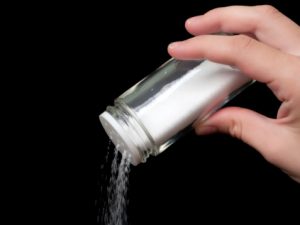 For as long as anyone can remember, it’s been said that salty foods make you thirstier. Previous studies have shown that increasing a person’s salt intake stimulated the production of more urine, with the assumption that the extra fluid came from drinking more beverages. But apparently, this is not true, as having a salt-filled diet makes you hungrier—not thirstier—in the long run. This new information comes from a study carried out during a simulated mission to mars, with an international group of scientists finding that what we thought we knew about salt’s interaction with our body is absolutely false.
For as long as anyone can remember, it’s been said that salty foods make you thirstier. Previous studies have shown that increasing a person’s salt intake stimulated the production of more urine, with the assumption that the extra fluid came from drinking more beverages. But apparently, this is not true, as having a salt-filled diet makes you hungrier—not thirstier—in the long run. This new information comes from a study carried out during a simulated mission to mars, with an international group of scientists finding that what we thought we knew about salt’s interaction with our body is absolutely false.
Researchers from the German Aerospace Center (DLR), the Max Delbrück Center for Molecular Medicine (MDC), and Vanderbilt University were interested in testing the effects of salt on metabolism, as conserving every drop of water in deep space is a high priority.
Advertisement
The salt study in question was composed of two groups consisting of 10 male volunteers each. They were sealed in a mock spaceship for two simulated flights to mars while data was gathered. The first group was examined over 105 days, while the other was examined over 205 days. Both groups had identical diets with the exception of a couple of weeks where they were given three different levels of salt in their meals.
Initial results showed that more salt was excreted in the urine, as was expected, but the overall quantity of urine did not show any variations from the norm. What the researchers did notice, however, was that the participants were actually drinking less water during their salty diet period, as salt was triggering a mechanism to conserve water in the kidneys.
Before this study, it was thought that extra salt in our foods was converted into sodium and chloride ions used in the body that grabbed onto water molecules and dragged them into the urine. The results of this new study show something different—the salt stayed in the urine, while water moved back into the kidney and body. This result came as a complete surprise to the researchers.
They hypothesized that the biological product urea—occurring in the urine and other body fluids as a product of protein metabolism—may play a role. By using rodent experiments, the researchers saw that urea was accumulating in the kidneys, where it counteracted the water-drawing force of sodium and chloride. Urea production consumes a lot of energy, which explains why mice on a high-salt diet were eating more. This coincided with the astronauts complaining of being hungrier during the mock mission.
Urea was thought of as a waste product of the body, but this new study shows that there is a previously unknown role of the molecular product.
Advertisement
“Instead, it turns out to be a very important osmolyte—a compound that binds to water and helps transport it. Its function is to keep water in when our bodies get rid of salt. Nature has apparently found a way to conserve water that would otherwise be carried away into the urine by salt.” said Prof. Friedrich C. Luft, MD of the Charité and MDC.
This study proves that our previous knowledge about salt may not be complete. The researchers admit they didn’t directly address blood pressure and other aspects of the cardiovascular system but recognized that salt and urea functions are tightly connected to water hemostasis and energy metabolism.
Related: New research confirms the dangers of salt
